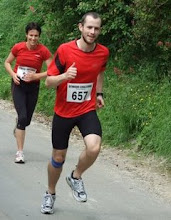
Here's chart I whipped up at the request of those working in Kilometres. I like to use minute-miles as that seems to be a fairly standard and common benchmark for running speed. The world record for a half marathon is 58:33 (Set in The Hague in 1986 by Samuel Wanjiru of Kenya) which is under a 4.5 minute mile. This is mind boggling when you consider that the fastest mile that's been run on record is 3.7 minutes. Mr. Wanjiru was only running only 50 seconds slower per mile, but over thirteen times further.

Today I beat my 7.0 min/mile target by a sniff. 4.5 miles in 31 minutes, equals 6.9 min/m and 13.9 kph. This took a lot of oomph and it's going to be very hard to sustain over a longer distance. I'm surprised how much extra effort is required to cut off each extra 20 seconds per mile. There's the best part of 11 weeks to go, however, so I've got time to work on it.
One issue I struggle with is the breakfast dilemma. I have always, as a rule, run first thing in the morning before breakfast. Running in this way is entrenched in my routine. As soon as I start getting into the theory of it all I start to lose the plot a bit - inevitably, the more I try to learn, the less I realise I understand. This aside, the basis I work on is that by running before breakfast, I'm burning leftover energy from the previous day and from there on, fat reserves.
I'm not too often in a position where I don't want to lose weight (I was in fact told my face looked fat post-Christmas by Warrick Kear last night at Institute) and so I welcome the above idea, generally ignoring the extent to which it actually might be erroneous.
Logic follows, however, that taking on board energy before running would allow me to run further and faster, therefore increasing my strength and stamina. One line of thinking suggests that it is muscle strength and fatigue that are my obstacles to running further at a higher speed, and that muscles will tire whether they are receiving energy from fat or from recently digested food; that I could therefore train on an empty stomach and still improve. I don't follow the theory further in (towards fast- and slow-twitch fibres, lactic acid accumulation and so forth). Maybe you have insights or links to useful articles? Do share them, if so.
One more point of interest: as far as energy consumption is concerned, from calorie charts I have studied it is apparent that calories are burned in proportion to the distance run, without much variation with the speed at which the run takes place - that's to say whether you run 5 miles in thirty minutes or in a full hour, roughly the same amount of energy is consumed getting you across that distance. This is different in, say, cycling where more speed results in rapidly increasing air resistance and energy expenditure.
Here is an approximate chart with varying body weight:

At half marathon distance, though, I'd be topping 1500 - now that's some decent burning. 1500 is about equivalent to my base metabolic rate - how many calories I burn daily without the morning run or my cycle commuting.





No comments:
Post a Comment